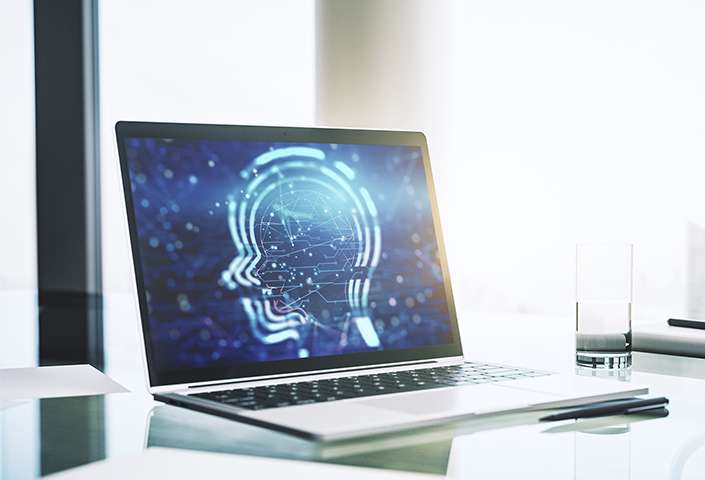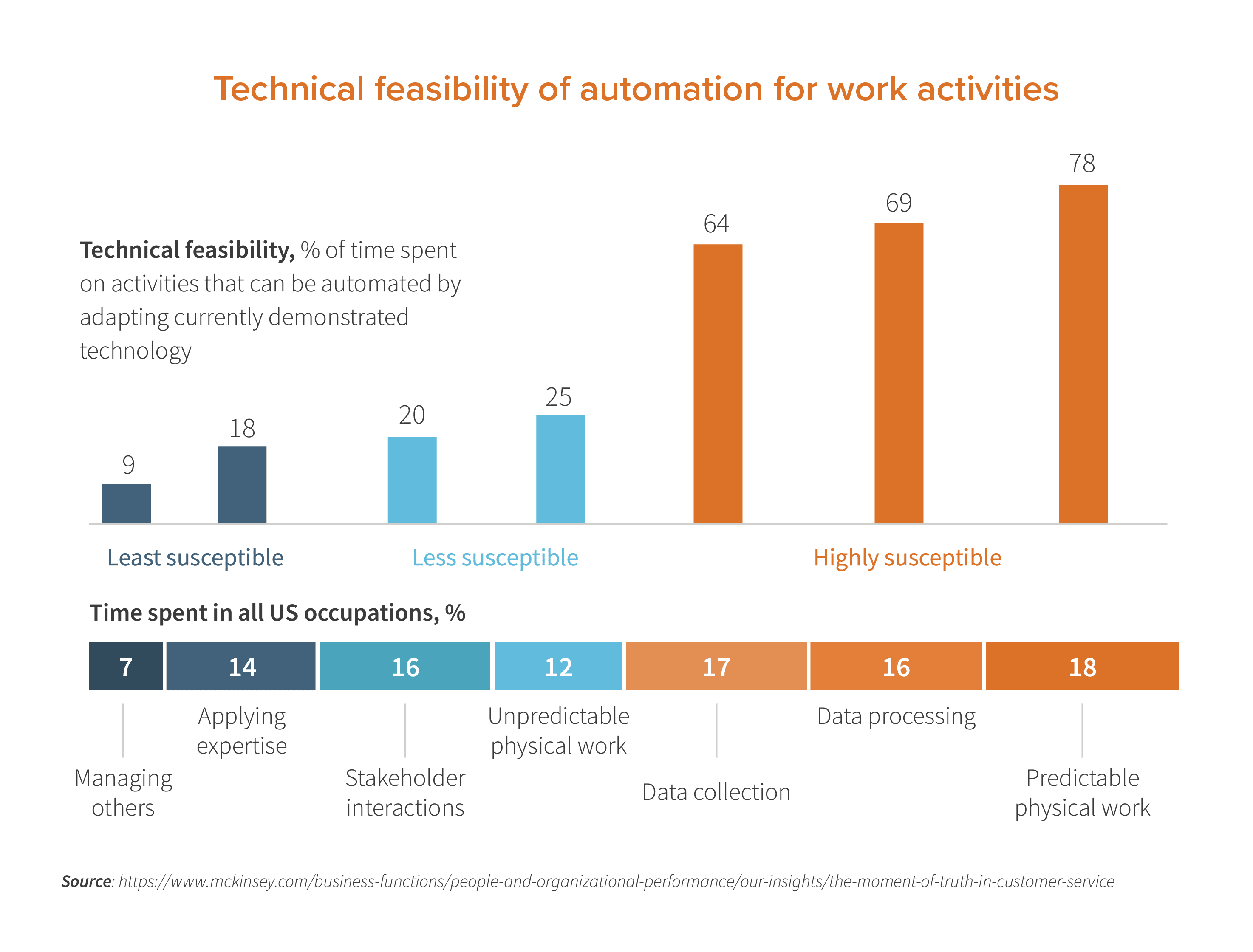Artificial intelligence (AI) has emerged as a transformative force in today's rapidly evolving business landscape, reshaping how companies operate and compete. As we delve into this topic, it's crucial to understand both the potential and the challenges that AI brings to the table.

Let's begin with a striking statistic: according to Grand View Research, the global AI market is projected to grow at a compound annual growth rate (CAGR) of 38.1% from 2022 to 20301. This remarkable growth trajectory underscores the increasing importance of AI in the business world.
The impact of artificial intelligence on business
AI's influence on business is far-reaching and profound. It's not merely about automation or replacing human tasks; rather, it's about augmenting human capabilities and unlocking new possibilities for growth and innovation.
To underscore the significance of AI in modern business, let's consider some key statistics:
- 77% of companies are either using or exploring the use of AI in their businesses2
- 83% of companies claim that AI is a top priority in their business plan2
- AI could increase labor productivity growth by 1.5 percentage points over the next ten years3
- Globally, AI-driven growth could be nearly 25% higher than automation without AI3
- 56% of businesses are using AI to improve and perfect business operations4
- 51% are turning to AI to help with cybersecurity and fraud management4
- 47% harness AI tools in the form of digital personal assistants4
- 46% are using AI for customer relationship management4
- 40% are turning to AI for inventory management4.
These statistics highlight the growing adoption and diverse applications of AI across various business functions. They also point to the potential for AI to drive significant productivity gains and economic growth.
Importantly, there's also a growing awareness of the need for responsible AI development:
- 85% of respondents support a national effort to make AI safe and secure5
- 81% of respondents think that industries should spend more on AI assurance5
- 85% of respondents want industries to be transparent about AI assurance practices before bringing AI-enhanced products to market5.
These figures underscore the importance of ethical considerations and transparency in AI implementation, a crucial aspect as businesses continue to integrate AI into their operations.
AI's impact across industries: a closer look
From life-saving medical gear to self-driving vehicles, artificial intelligence has made its way into virtually every aspect of our lives. Whether it’s to improve workflows, reduce human error, provide deeper analytics, foster more informed decision making or allow for 24/7 capabilities, AI was invented to make our lives more efficient.
The impact of AI in the medical industry
38% of healthcare providers are using AI to help with patient diagnoses6. Clinical health AI applications could see annual cost savings of up to U.S.$150 billion by 20267.
AI-powered computer systems have made their way into the healthcare sector. Popular applications of AI include diagnosing patients, improving communications between doctors, physicians and patients, transcribing medical documents, drug development and remote patient treatments.
The impact of AI in the mining industry
A study by Deloitte found that implementing artificial intelligence within a mining business allowed improved data processes making them 18 times faster than what was previously done in the field8.
When considering applications of AI within the mining industry, we see a transition from a people-focused operation to a process-oriented one. This change can hope to improve overall OHS conditions for mineworkers, increase accuracy, decrease environmental footprints and provide faster decision-making abilities in an environment where any error could result in significant repercussions.
The impact of AI in the banking sector
The banking sector has introduced artificial intelligence to help with fraud detection, enhance customer experiences (CX) with online banking applications, personalization of customer services, more efficient customer credit analysis and improvements with compliance. According to IDC, the banking sector will be one of the top industries that invest in AI solutions by 2024. And rightly so, with artificial solutions expected to add more than U.S. $1 billion in value to the banking industry by 20359.
The impact of AI in the accounting industry
AI in accounting helps enhance the efficiency of internal accounting practices, purchase orders, invoicing, procurement, expense reports and accounts payable or receivable functions. Accounting is driven by data and in many instances, accounting-related tasks such as banking reconciliations are repetitive and time consuming. This makes it the perfect environment for artificial intelligence and machine learning. AI within the accounting market is expected to reach U.S. $161.8 million by 202810, with 80% of business leaders believe AI provides them with a competitive advantage11.
Want to learn how artificial intelligence is transforming the future of accounting?

The impact of AI in the construction industry
From planning to building, construction and engineering professionals use artificial intelligence to add that extra element of accuracy and efficiency to their projects. It also helps with monitoring and keeping track of equipment, maintenance, construction errors and potential safety issues. A McKinsey report states that the implementation of AI within construction firms could lead to productivity increases of around 50% through real-time data analysis12.
The impact of AI in the retail sector
AI and retail are a match made in heaven in an industry where customer experience and satisfaction is a key metric. AI can provide the ability for hyper-personalization of services and make efficient recommendations for service or product selections to increase customer loyalty and satisfaction. AI in the retail sector is anticipated to grow to U.S. $20.05 billion by 202613.
How AI enhances business functions
AI's capabilities extend across various aspects of business operations:
- Task automation: by handling routine tasks, AI frees up valuable human resources for more strategic, creative endeavors.
- Data-driven decision making: AI's ability to process and analyze vast amounts of data leads to more informed, timely decisions.
- Customer experience enhancement: through personalization and predictive analytics, AI helps businesses create more tailored, engaging customer interactions.
- Operational efficiency: AI-driven process optimization can significantly reduce costs and improve productivity.
- Risk management: in areas such as fraud detection and cybersecurity, AI provides more robust, real-time protection.
- Innovation acceleration: AI enables rapid prototyping and testing, speeding up product development cycles.
As we explore these capabilities, it's important to recognize that AI is not a one-size-fits-all solution. Its implementation requires careful consideration of a company's specific needs, resources, and strategic goals.
Artificial intelligence and the future of work
One of the most popular questions when it comes to artificial intelligence is “will I lose my job to a robot?”
The answer: this is dependent on the way in which your business decides to integrate artificial intelligence into its operations. Will complete business functions become a write-off as automation of processes comes in? Or, will the introduction of a AI chatbot provide the support of 10 to 20 customer service representatives, allowing the human employees more time to work on customer retention strategies? It is completely dependent on what AI-powered implementation tactic works for your business.
Research into this controversial topic are unbiased and aim to showcase both ends of the argument: a loss of work versus an increase in job opportunities. For example, cognitive technologies such as robots, AI, machine learning and automation will replace 16% of jobs but also create 9% of new jobs in the United States by 202514.
A McKinsey study analyzed over 2,000 work activities across 800 role occupations to accurately examine the technical feasibility of automation15.

What these results tells us is that even when ‘machines take over’ tasks within any occupation, there are activities in which AI cannot be relied on to cover such as managing others, applying expertise and stakeholder interactions.
Explore further: The environmental impact of artificial intelligence
Artificial intelligence can help combat climate change but can also be a major contributor to the emissions issues our world is facing. The energy it takes to ‘train’ an AI program can be excessive. Take the training of a powerful language model which was estimated to have consumed enough energy during it’s training stages to leave a carbon footprint big enough to drive a car ‘from Earth to the moon and back’16.
On the other hand, the long-term effects of implementing AI on the environment, could positively enable 93% of environmental-based targets such as the creation of low-carbon cities, IoT devices that modulate their consumption of electricity, smart grids that integrate renewable energy and the ability to combat marine pollution17.
Embracing artificial intelligence to improve your business operations
By introducing AI and it’s quick learning capabilities, businesses can create super-powered data processing machines that can generate information, extrapolate large amounts of data and even take care of tasks that free up time and budget for organizations to focus on more face-to-face tasks.
Technologies such as artificial intelligence (AI) have already shown great potential to improve customer experience and engagement. More and more organizations are choosing to interact with their customers via voice interfaces and chatbots and as the technology improves, these applications will be able to conduct seamless customer service conversations at any time of the day or night.
For decades, companies have been forced to deal with industrial machines breaking down during the production process. Now imagine being able to perform predictive maintenance based on previously inaccessible insights into their operation. That is just one of the benefits of machine learning algorithms, which, along with artificial intelligence, are allowing companies to tap into volumes of information generated across their business units, partners and third-party sources.
For McKinsey, it will be a world in which digital channels become the primary - and perhaps only - customer engagement models and automated processes become a primary driver of productivity18. Either way, any business not preparing for the digital change that is coming, is a business that will struggle to remain competitive.
Economic impacts of artificial intelligence
It’s evident that AI can help improve growth for many organisations through enabling productivity and efficiency improvements. It improves the decision-making process through the analysis of big data sets, can support the identification of new products and services and boost customer demand by generating new revenue streams.
However, the creation of ‘super firms’, industry-leading AI organizations, could spell economic monopolisation and be potentially detrimental. AI could also widen the gap between developing and developed countries by boosting the need for qualified, skilled workers well-versed in automation and machine-learning. The disruptive effects of AI may also influence wages, income distribution and economic inequality19.
Digital disruption drives digital innovation
Times of disruption and change can be uncomfortable. Artificial intelligence is just one of the many digital disruptions taking the world by storm. Over the last few years, the need to innovate has become essential and digital disruption is helping businesses stay competitive in the ever-changing business environment.
How can your business accelerate purposeful innovation, like investing in AI? What are the current business trends and “new digital opportunities” you can implement today? And, why are agile methodologies more important than ever? This blog, ‘How digital disruption can drive business innovation’ will take you through how your business can effectively use digital disruption in today’s “noisy” world.



